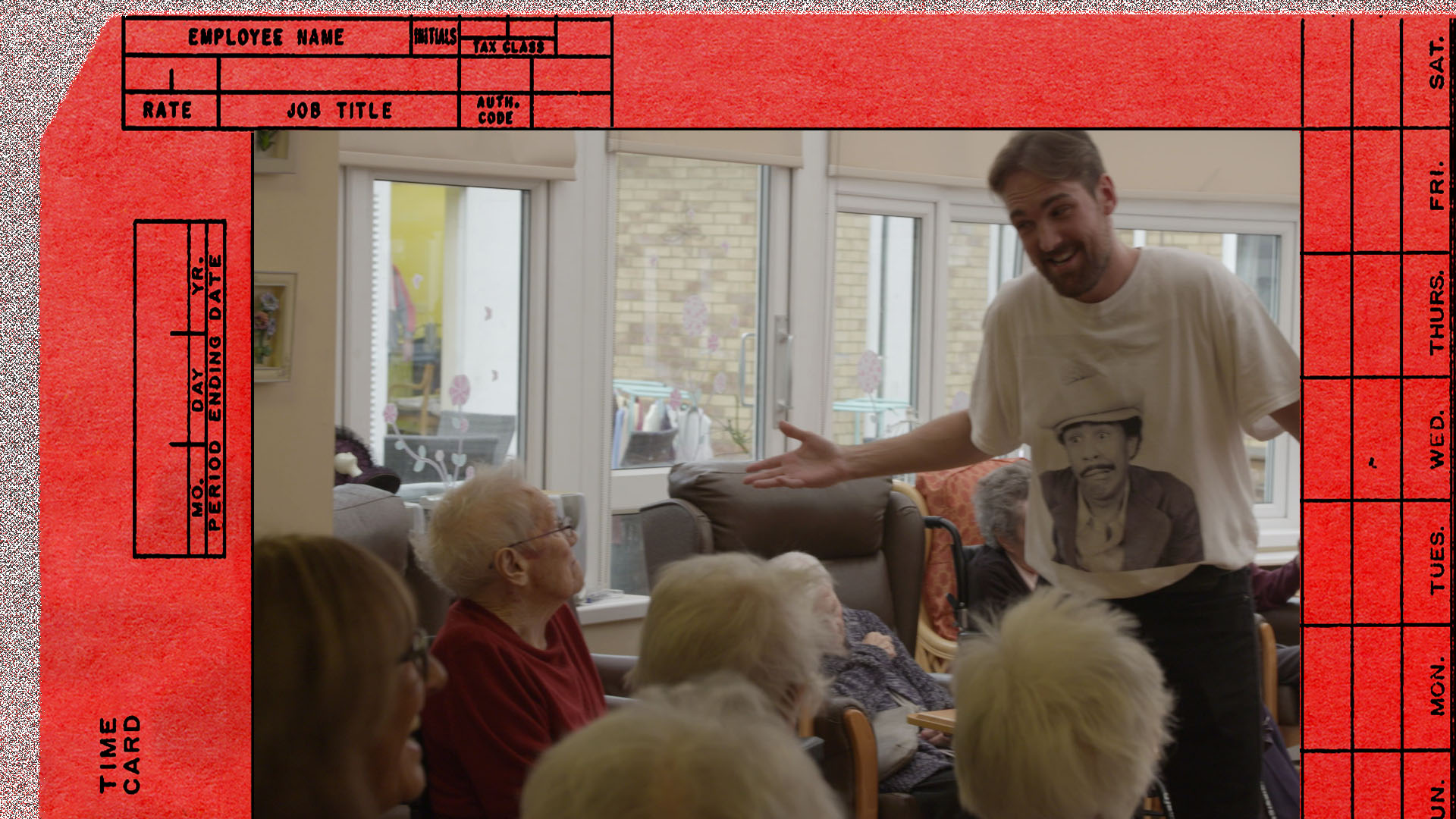How Laughter Is Building Solidarity Between Care Home Residents and Workers
by Pope Lonergan
1 October 2020

I’m Pope Lonergan: comedian, Quaker, (recovering) drug addict and, I’d hazard, the only stand-up who’s changed an incontinence pad between sets.
The reason I joke about death, dementia, shit, suicide and shoving a bar of soap up my arse after accidentally breaking a woodlouse’s pregnancy sack is that before comedy, I worked in a care home for nine years.
There’s a dourness to these spaces: the austere functionality of handrails and electric bath lifts; the hum of strip lights. Cheap plastic frames, filled with low-res images of people the residents neither recognise nor care about: a scene from a film about the Kray Twins, but the Tom Hardy one; photos of residents who’ve been dead for 15 years, wearing party hats and waving at a mouse; Fred Elliott off Coronation Street opening a supermarket in Guernsey; Jim Bowen.
Eldercare assistants inhabit a failing system, one that does little to mitigate the humiliations of old age, particularly when combined with neurodegenerative disease. The good carers – like me, a saint, a jogging-bottomed Barachiel – try to anyway.
I once had a deep bond with a 98-year-old who sometimes hallucinated that smoke and water were filling the room, and that “Chinamen” were sewing gold thread into the wallpaper. In her more lucid moments, we’d discuss everything from JFK’s assassination to how we’d like to be disposed of when we died. She wanted to be buried under “a big tree”. She passed away just before lockdown, and I hope she’s where she wanted to be: tangled in roots.
Of the work she did in care homes, the American essayist Sallie Tisdale writes: “The stark fact is that dementia is incurable, progressive, and fatal, but here is the surprise: in the company of the demented, one finds peace and unquestioned love in at least as much measure as in the rest of the world”. One also finds an octogenarian named Peter pissing on my arse while I rescue a porcelain Jesus – which Peter kept referring to as Enoch Powell – from under his bed.
Care is predicated on the movement beyond awareness of another person (“Oh, look. There’s a man emptying his catheter bag into a Princess Diana biscuit tin.”) to recognition of them as a person (“He must be confused. Maybe I should help him?”). Yet this movement goes against that of profit, which encourages us to reduce residents to commodities, potted plants to be fed, watered and kept out of direct sunlight.
Due to staff shortages, carers work gruellingly long hours – I’d regularly do back-to-back 14-hour shifts – often for minimum wage. (To give you a brief example of how undervalued care is, in Edinburgh, I appeared in comedian Phil Ellis’s show Au Revoir. I had to dress up as a clown, pretend to suck off a trombone then get shot in the head. I was paid £2.80 more per hour for this than for keeping an elderly person alive.) Because agency staff cost more, care companies resist hiring them to fill staffing gaps. Overworked and underpaid, carers are left able to fulfil only residents’ most basic needs. There’s simply no time to cultivate relationships, to laugh together.
Of course, black humour courses through the veins of the care sector, filling break rooms. Not only is it a coping mechanism, it’s also a way of distinguishing between those who are desensitised to the sight of a basal-cell carcinoma engulfing someone’s head, and those who aren’t. The care sector is full of humour, it’s just that it usually circulates exclusively among carers; rarely is it extended to residents.
I started The Care Home Tour to do just that. While I was working I realised that, while residents struggled to follow a joke, they’d laugh and clap at my crap karate. So we filled the show with slapstick. I teamed up with Ben Target, known for his innovations in clowning and participatory comedy, and assembled a group of comedians for an hour of improvised slapstick. After a lot of trial and error, we have an improv troupe consisting of three comedians and an audience of care home residents, who direct the play. The carers – and family members – are also encouraged to be part of the fuck-about.
The authors of The Care Manifesto: The Politics of Interdependence write that “[if we’re] to reimagine a genuinely caring politics, we must begin by recognising the myriad ways that our survival and our thriving are everywhere and always contingent on others”. This is exactly the truth The Care Home Tour tries to affirm. By migrating the carnival of caring onto the stage, I want to catheterise care, to drain it of its misery, but also to create a mutuality in which care flows in both directions; we support each other through the performance; we laugh with and at each other.
Sometimes, though, the dynamic reverts to a more familiar one. In the middle of Adam Ritches’ Bean impression, someone soiled themselves. People shit; grow-up. So I took off my (literal) MC hat and escorted him to the toilet. I bet Michael McIntyre’s never done that.
Pope Lonergan is a carer, comedian and podcaster. Pope’s Addiction Clinic opens at the Battersea Arts Centre on 4 October.
- The Future of Work focus is part of Novara Media’s Decade Project, an inquiry into the defining issues of the 2020s. The Decade Project is generously supported by the Rosa Luxemburg Foundation (London Office).
- This article was amended on 1 November 2021 to remove some of the author’s personal information.